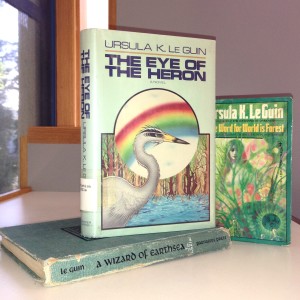Groundbreaking science fiction author Ursula K. LeGuin, known for her philosophical and forward-thinking novels like the “Earthsea” trilogy, died on January 22. She was 88.
In 1983, LeGuin delivered the Mills College commencement address. In her speech, she questioned her audience about their purpose after college, and in life. She asked, what is success?
“Success is somebody else’s failure. Success is the American Dream we can keep dreaming because most people in most places, including thirty million of ourselves, live wide awake in the terrible reality of poverty. No, I do not wish you success. I don’t even want to talk about it. I want to talk about failure.
Because you are human beings you are going to meet failure. You are going to meet disappointment, injustice, betrayal, and irreparable loss. You will find you’re weak where you thought yourself strong. You’ll work for possessions and then find they possess you. You will find yourself — as I know you already have — in dark places, alone, and afraid.
What I hope for you, for all my sisters and daughters, brothers and sons, is that you will be able to live there, in the dark place. To live in the place that our rationalizing culture of success denies, calling it a place of exile, uninhabitable, foreign.
Well, we’re already foreigners. Women as women are largely excluded from, alien to, the self-declared male norms of this society, where human beings are called Man, the only respectable god is male, the only direction is up. So that’s their country; let’s explore our own.”
The full text is on her website, ursulakleguin.com.
Also on her website, LeGuin wrote pages and pages about her experience as a writer: she posted a rejection letter she received, her own tips for writers, handfuls of her poems and excerpts from her books, illustrations that accompanied her novels, around 60 reviews she wrote of other books, recorded interviews, and even a section she titled “Some Real Good Quotes.” Her website is loaded with insight into her experiences as a working writer — into the universe that she created.
And it’s a very wild universe. Her novels explore other planets, distant galaxies, and the beings she imagines would live there. LeGuin’s work explores societies with genderless members, anarchist social experiments, struggles for survival on harsh planets, suspicion between alien species, and much more.
LeGuin’s parents were Theodora Kroeber, who held a Master’s in clinical psychology and studied anthropology, and Alfred Kroeber, an anthropology professor at UC Berkeley. They gave birth to her in the city of Berkeley in 1929. Her mother wrote the book “Ishi: last of his tribe,” a chronicle of the life of an indigenous man in the Bay Area whose family and people were displaced, often through violence, by settlers. LeGuin’s father learned his story and learned from him.
LeGuin’s plots and characters reflect a worldview that seems influenced by her parents’ work and her own expansive philosophizing. She delves deep into questions like: what is polite on another planet? What is romance like among an extraterrestrial species that morphs between genders? If leaving this planet to settle another were possible, would it solve anything? Are they weird, or am I?
Before she came along, science fiction writing was often futuristic, mind-bending and imaginative, but the field was male-dominated. The storylines in dime novels reflected the misogyny of the world these writers knew, and what they fantasized about. This is still often true, but LeGuin did a lot to change a little bit of that.
In her long career, LeGuin wrote nine novels and many more stories, poems, essays and commentaries.
Find LeGuin’s novels in the F.W. Olin Library in the fiction and juvenile fiction shelves. I genuinely recommend the titles I have read: “The Dispossessed,” “Lathe of Heaven” and “The Left Hand of Darkness.”

